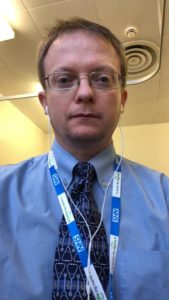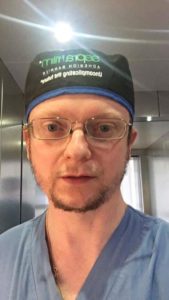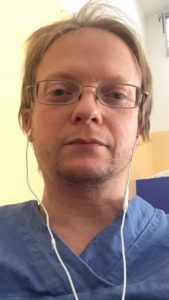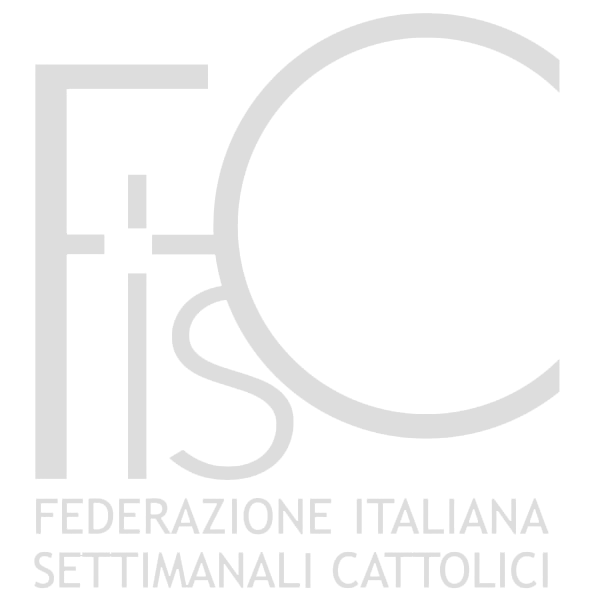For our international readers: at the end of the article, after the photos, you can find the English version
COLONNELLA – Tra i numerosi medici colonnellesi, che svolgono la loro professione fuori sede, oggi riportiamo l’esperienza di un illustre chirurgo di fama nazionale ed internazionale, da pochi mesi anche Docente Universitario di Chirurgia Generale presso l’Università dell’Insubria in Lombardia. Si tratta del Prof. SALOMONE DI SAVERIO, medico colonnellese, già Pagella d’Oro del Liceo Classico Statale Leopardi della nostra San Benedetto del Tronto, il quale, dopo la Laurea in Medicina e Chirurgia conseguita presso l’Università Cattolica di Roma e la Specializzazione in Chirurgia Generale ottenuta presso l’Università di Bologna, ha affinato le sue capacità professionali in molteplici esperienze formative all’estero, in particolare negli Usa, in Sud Africa ed in Inghilterra. Dopo essere stato per sette anni Capo Equipe e Responsabile della Chirurgia Laparoscopica d’Urgenza e del Trauma all’Ospedale Maggiore di Bologna e per due anni Primario di Chirurgia Colorettale all’Ospedale dell’Università di Cambridge, è tornato da poco in Italia per adempiere al doppio impegno di Professore Universitario all’Insubria e Primario della Chirurgia 1 dell’Ospedale di Circolo di Varese. Il nostro Dottore è membro di molte riviste scientifiche, in particolare del Giornale Britannico di Chirurgia e del Giornale della Società Britannica di Chirurgia Colorettale, avendo pubblicato più di 300 articoli peer reviewed e 700 abstracts per articoli non peer reviewed.
Com’è la situazione a Varese ?
Prima di tutto vorrei ringraziarvi per aver dato voce alla nostra categoria a volte non apprezzata adeguatamente dalla società moderna, ma spesso anche protagonista di atti di eroismo quotidiano. Sono onorato ed orgoglioso di dare un contributo alla nostra comunità parrocchiale e diocesana.
Premesso questo, vi illustro la situazione qui a Varese. Siamo nella Lombardia del Nord, al confine con la Svizzera, dove il sistema sanitario è tra i migliori in Italia ed Europa, che è anche il motivo per cui ho accettato di rientrare dall’estero. Ciò nonostante, la situazione è di estrema emergenza: le due province di Brescia e Bergamo sono le più colpite; Varese, al momento, sta reggendo bene. Le istituzioni sono attentissime alle esigenze di tutti, così come le autorità sanitarie; gli operatori sanitari hanno permessi speciali per poter circolare e parcheggiare; le attività produttive sono ridotte al minimo. Anche la popolazione è molto disciplinata: ci sono file ordinatissime ai supermercati, tutti (sia dipendenti che utenti) hanno la mascherina e le persone escono di casa il meno possibile.
Come è cambiata la vita in reparto da quando è iniziata l’emergenza coronavirus?
I cambiamenti in reparto sono molteplici. Prima di tutto abbiamo interrotto completamente l’attività chirurgica ordinaria e poi anche quella oncologica. Tutte le forze ospedaliere sono utilizzate per curare i pazienti contagiati da Covid-19. In particolare, sono stati reclutati molti assistenti giovani, anche chirurghi specializzandi, per assistere e ventilare i pazienti. Io, nella mia posizione, resto a disposizione solo per gli interventi chirurgici urgenti, quindi solo se strettamente necessari e non differibili. Questa è una precisa scelta di politica aziendale: si cerca di esporre il meno possibile al contagio i chirurghi più “anziani” ed esperti perchè, nel caso si ammalassero, il reparto non avrebbe professionisti in grado di far fronte alle urgenze chirurgiche. È importante in questo momento dosare le risorse, anche e soprattutto quelle umane. Purtroppo abbiamo già subìto la perdita del Dott. Stella che, pur essendo il Presidente dell’Ordine dei Medici di Varese, non si è risparmiato di fronte all’epidemia e fin dall’inizio dell’emergenza è stato in prima linea a visitare e trattare i pazienti, restando così contagiato e pagando con la vita il suo alto impegno umano e civile.
Un altro cambiamento importante in reparto riguarda la protezione individuale sia degli operatori sanitari sia dei pazienti: per proteggerci al meglio da eventuali contagi abbiamo sviluppato protocolli nuovi e molto rigidi. Alcuni paesi esteri come gli Usa, il Regno Unito e altri paesi dell’Unione Europea, ci hanno chiesto di condividere la nostra esperienza italiana, in particolare lombarda, della gestione dei pazienti chirugici urgenti emergenti e non nell’epoca del coronavirus oppure di pazienti contagiati che necessitano di essere operati: gli articoli scientifici e video che stiamo pubblicando in queste settimane mostrano come le procedure di vestizione e svestizione siano molto precise e rigorose, perchè da quelle dipende la possibilità o meno di essere contagiati, e forniscono indicazioni pratiche sulla gestione dei pazienti che necessitano di intervento chirurgico durante questa pandemia. Infatti purtroppo come ho già sottolineato sui Media, alle vittime per e con Coronavirus, dovremo aggiungere presto il novero delle vittime durante il coronavirus, a causa degli inevitabili ritardi diagnostici e terapeutici o cambi di strategia terapeutica per i tumori ed altre malattie, resisi necessari in conseguenza dell’impegno delle risorse a contrastare l’epidemia COVID-19. In quest’ottica con un gruppo di colleghi chirurghi colorettali italiani, inglesi e spagnoli e con la collaborazione e il convolgimento del nostro attuale vice-ministro della salute, Prof Sileri (peraltro lui ha collaborato al mio lavoro scientifico proprio durante i giorni della sua quarantena, avendo anche lui contratto l’infezione), abbiamo recentemente pubblicato un articolo scientifico di raccomandazioni pratiche pubblicato sul giornale britannico di Chirurgia Colorettale e recepito anche dalla OMS come letteratura rilevante in questo periodo di pandemia. LINK https://www.ncbi.nlm.nih.gov/pubmed/32233064
Infine, il cambiamento maggiore avvertito in reparto riguarda la nostra emotività: è terribile vedere che molto spesso i pazienti gravi muoiono soli, senza il conforto dei loro familiari né degli amici, al massimo qualche medico pietoso riesce a permettere loro una videochiamata, ma per il resto vengono isolati. È davvero un’esperienza toccante sia come medico sia come uomo. In questi giorni ho avuto modo di riflettere molto anche sulla mia situazione personale che mi vede colpito da un lutto importante (la perdita di mia madre nel mese di Febbraio) e ho concluso che, sebbene in alcuni momenti vorrei non averla persa, razionalmente ringrazio Dio per avermi permesso di starle accanto e di averla curata, personalmente e strenuamente, ed averle donato tutto il mio amore di figlio: se n’è andata, infatti (anche lei per una setticemia e polmonite pur non correlata al Covid-19), tra le mie braccia, dopo aver trascorso con me undici giorni in cui non l’ho lasciata neanche un attimo. Ritengo che questa sia stata un’ultima benedizione di Dio, quel Signore che lei tanto aveva servito da lettrice, catechista, ministro dell’Eucaristia, e che aveva servito con tanta fede, come tutti voi di Colonnella ricordate.
Come sta vivendo la lontananza da Colonnella e dai suoi cari?
Colonnella è sempre nel mio cuore. Ci sono momenti in cui, anche in ospedale, mi ritiro a pensare ai miei genitori, agli amici e ai parenti che negli ultimi mesi ho avuto modo di incontrare, quelli che venivano a portare un piccolo omaggio, quelli che – sapendo della mia presenza in loco – venivano a chiedermi un consiglio professionale, quelli che ho aiutato a risolvere problemi di salute più o meno gravi. In quei giorni ho provato la soddisfazione di aver raggiunto quello che mio padre Tito aveva sempre sognato, cioè che io facessi il medico per aiutare tutti quelli del paese; tante volte mi ha detto: “Tu li aiuti e la gente ti vuole bene.” In effetti è stato proprio così: a volte è bastata anche solo una parola di conforto, altre volte sono intervenuto personalmente per risolvere un problema, altre volte ancora li ho indirizzati ad altri colleghi.
Oltre alle persone, sono tante le cose che mi mancano di Colonnella, ma in particolare le sensazioni che scaturiscono dai sensi e che si intersecano con la memoria, una “proustiana” memoria. Il gusto: un dolce tipico colonnellese; la vista: lo scorcio dell’arco di Tito con il sole che sorge da un lato e tramonta dall’altra parte; l’udito: la brezza colonnellese che scompiglia le chiome dei castagni vicino casa. Inoltre mi manca molto la partecipazione alle feste religiose: in particolare quest’anno avevo sognato di far affacciare mia madre durante la processione per farle vedere la statua di San Gabriele, lei che portava il suo nome e che tanto l’ha venerato. Purtroppo è andata diversamente. Tuttavia, resto sempre in contatto con i miei amici colonnellesi: qualche settimana fa mi è stato inviato il video di don Dino che cammina per le vie deserte del paese, esponendo il Santissimo ed elargendo benedizioni ai colonnellesi: i miei genitori si sarebbero commossi nel vedere una scena del genere e anch’io mi sono commosso a questo pensiero.
I ricordi sono tanti, soprattutto legati alle feste religiose e alla mia infanzia. Ho stimato tutti i sacerdoti che si sono susseguiti nella nostra parrocchia, in particolare don Marcello, che più degli altri ho vissuto in prima persona e che, per motivi anagrafici, più ha contribuito alla mia formazione spirituale ed umana: quando facevo il chierichetto prima, il ministro della lettura poi (ruolo a cui mia mamma Gabriella teneva moltissimo e a cui mi aveva esortato fin da bambino e poi da giovane liceale), le processioni del Cristo Morto, le Messe di Natale, il Presepe vivente, le feste di paese, un paese di grande tradizione religiosa che spero possa tornare al più presto all’antico splendore.
Che messaggio si sente di dare ai nostri lettori?
Mi auguro che la comunità colonnellese e diocesana, a causa della pandemia in corso, non paghi in termini di vite un prezzo così alto come è avvenuto qui in Lombardia. Mi auguro che nessuna delle persone anziane che conosco possa morire a causa di questo. Mi auguro che chi rimarrà sappia risorgere ad una nuova vita, al recupero memoriale dei valori dei nostri genitori e dei nostri nonni. Forse negli ultimi anni, molti hanno perso di vista i valori veri della vita, strizzando l’occhiolino al paganesimo, al dio successo, al dio piacere, a tutte quelle attrazioni del mondo che sono poi lusinghe del maligno. Mi auguro che tutti i Colonnellesi possano tornare ai valori di qualche decennio fa che ispiravano la vita paesana: i valori cristiani di carità, solidarietà, onestà e giustizia. Mi auguro che i miei compaesani sappiano mettere da parte i valori del consumismo, del denaro, degli interessi: stavamo andando verso una società troppo orientata al benessere, a mammona, all’apparenza esteriore, all’interesse personale, senza riconoscere nell’altro un mio fratello, e senza rispettare l’ambiente che ci circonda. Mi auguro che anche gli amministratori di Colonnella sappiano focalizzare la loro politica a questi obiettivi: una maggiore valorizzazione degli scenari naturalistici che il nostro paese ospita, il rispetto dei luoghi e delle tradizioni a noi care, il recupero di valori come la solidarietà, la giustizia sociale, l’interesse della collettività. Mi auguro che i Colonnellesi riacquisiscano quelle qualità che ci hanno sempre distinto, come la generosità, l’aiuto reciproco, il volersi bene, tutti bene, quella che noi cristiani chiamiamo vera comunione e che i nostri genitori avrebbero voluto in un tempo tanto difficile come quello che stiamo vivendo.
A Colonnella’s off-site doctor: the word to Salomone Di Saverio, University Professor and Primary Surgeon in Varese
Colonnella – Among the numerous Colonnella’s Doctors, who carry out their profession off-site, today we report the experience of an illustrious surgeon of national and international fame, from a few months also Professor of General Surgery at the University of Insubria in Lombardy. This is Prof. SALOMONE DI SAVERIO, of Colonnellese origin, former “Golden School Report” of the Leopardi State High School of our San Benedetto del Tronto, who, after the Degree in Medicine and Surgery at the Catholic University of Rome and the Specialization in General Surgery obtained at the University of Bologna, perfectioned his professional skills in multiple educational experiences abroad, in particular in the USA, South Africa and England. After having been Head of Team and Head of Emergency Laparoscopic Surgery and Trauma for seven years at the Maggiore Hospital of Bologna and then Consultant (Primary) surgeon of Colorectal Surgery at the University of Cambridge Hospital for two years, he recently returned to Italy to fulfill to the dual commitment of University Professor at the Insubria and Primary Doctor at the Surgery 1st Unit of the Varese Hospital. Our Doctor is a member of many scientific journals, in particular the British Journal of Surgery and the Journal of the British Society of Colorectal Surgery, having published more than 300 peer reviewed articles and 700 abstracts for non peer reviewed articles.
How is the situation in Varese?
First of all I want to thank you for giving voice to our category which is sometimes not appreciated adequately by modern society, but it is often also the protagonist of acts of daily heroism. I am honored and proud to make a contribution to our parish and diocesan community.
Now I can illustrate the situation here in Varese. We are in Northern Lombardy, on the border with Switzerland, where the health system is among the best in Italy and Europe, which is also the reason why I agreed to return from abroad. Nonetheless, the situation is extremely emergency: the two provinces of Brescia and Bergamo are the most affected; Varese is currently holding up well. Institutions are very attentive to everyone’s needs, as well as health authorities; health workers have special permits to be able to move and park; production activities are reduced to a minimum. The population is also very disciplined: there are super-ordered lines at supermarkets, everyone (both employees and users) has a mask and people leave the house as little as possible.
How has life in the ward changed since the coronavirus emergency started?
The changes in the department are manifold. First of all we completely stopped the ordinary surgical activity and then also the oncological one. All hospital forces are used to treat patients infected with Covid-19. In particular, many young assistants, including specialist surgeons, were recruited to assist and ventilate patients. In my position, I remain available only for urgent surgical interventions, therefore only if strictly necessary and not deferred. This is a precise choice of company policy: we try to expose the oldest and most experienced surgeons as little as possible to the infection because, if they get sick, the department would not have professionals able to cope with surgical emergencies. At this time it is important to dose the resources, also and above all the human ones. Unfortunately we have already suffered the loss of Dr. Stella who, despite being the President of the Varese Medical Association, did not spare himself in the face of the epidemic and from the beginning of the emergency he was on the front line to visit and treat the patients, thus remaining infected and paying with life his high human and civil commitment.
Another important change in the ward concerns the individual protection of both health workers and patients: to better protect ourselves from any infections, we have developed new and very rigid protocols. Some foreign countries such as the USA, the United Kingdom and other European Union countries have asked us to share our Italian experience, in particular in Lombardy, in the management of emergency surgical patients emerging and not in the coronavirus era or infected patients that need to be operated: the scientific articles and videos that we have been publishing in recent weeks show that the dressing and undressing procedures are very precise and rigorous, because the possibility of being infected or not depends on them, and they provide practical indications on the management of the patients in need of surgery during this pandemic. In fact, unfortunately, as I have already pointed out in the Media, to the victims for and with Coronavirus, we will soon have to add the list of victims during the coronavirus, due to the inevitable diagnostic and therapeutic delays or changes in the therapeutic strategy for tumors and other diseases, which have become necessary in consequence of the commitment of the resources to fight the COVID-19 epidemic.With this in mind, with a group of Italian, English and Spanish fellow colorectal surgeons and with the collaboration and involvement of our current Vice-Minister of Health, Prof Sileri (he also collaborated on my scientific work during the days of his quarantine, having he also contracted the infection) we recently published a scientific article of practical recommendations published in the British Journal of Colorectal Surgery and also received by the WHO as a relevant literature in this pandemic period: https://www.ncbi.nlm.nih.gov/pubmed/32233064
Finally, the biggest change felt in the ward regards our emotionality: it is terrible to see that serious patients often die alone, without the comfort of their family or friends, at most some pitiful doctor can allow them a video call, but for the rest are isolated. It is a lacerating experience both as a doctor and as a man. In these days I have had the opportunity to reflect a lot also on my personal situation which sees me affected by an important mourning, the loss of my mother in the month of February, and I concluded that, although in some moments I think I would not have lost her, I rationally thank God for allowing me to stay with her and to take care of her personally and strenuously and to have given her all my love as a son: in fact she left among the my arms (she too for a septicemia and pneumonia although not related to Covid-19), after spending eleven days with me when I didn’t leave her for a moment. I believe this was a last blessing from God, that Lord whom she had served so much as a reader, catechist, Minister of the Eucharist, and who had served with so much faith, as all of you in Colonnella remember.
How is the distance from Colonnella and his loved ones living?
Colonnella is always in my heart. There are moments when, even in the hospital, I retire to think about my parents, friends and relatives that I have had the opportunity to meet in recent months, those who came to bring a small tribute, those who – knowing of my presence in loco – came to ask me for professional advice, the ones I helped solve more or less serious health problems. In those days I felt the satisfaction of having achieved what my father Tito had always dreamed of me, that I was a doctor to help everyone in the country; many times he told me: “You help them and people love you.” In fact it is just like that: sometimes even a word of comfort is enough, other times I personally intervene to solve a problem, other times I address them to other colleagues.
In addition to people, there are many things that I miss about Colonnella, but in particular the sensations that arise from the senses and that intersect with memory, a “Proustian” memory. The taste: a typical Colonnella’s dessert; the view: the glimpse of the arch of Titus with the sun rising on one side and setting on the other side; hearing: the colonnellese breeze that disrupts the chestnut trees near the house. Furthermore, I really miss the participation in religious holidays: in particular this year I had dreamed of having my mother appear during the procession to show her the statue of Saint Gabriele, whose name she shared and whom she venerated so much in her life. Unfortunately, it went differently. However, I always keep in touch with my Colonnellese friends: just in these days a Colonnellese sent me the video of Don Dino walking through the deserted streets of the town, exposing the Blessed Sacrament and giving blessings to the Colonnelleses: my parents would have been moved in to see such a scene and I was moved by this thought too.
The memories are many, especially related to religious holidays and my childhood. I have esteemed all the priests who have followed one another in our Parish, in particular Don Marcello, who more than any other I have experienced personally and who, for personal reasons, has contributed most to my spiritual and human formation: when I was the altar boy before, then the minister of reading (role that my mother Gabriella cared about a lot and to which she had exhorted me since I was a child and then as a high school student), the processions of the Dead Christ, the Christmas Masses, the Living Nativity, the village festivals, a village of great religious tradition which I hope will return to its former glory as soon as possible.
What message do you feel to give to our readers?
I hope that due to the ongoing pandemic, the Colonnella and diocesan community will not pay such a high price in terms of lives as has happened here in Lombardy. I hope none of the older people I know can die from this. I hope that those who remain will know how to rise to a new life, to the memorial recovery of the values of our parents and grandparents. Perhaps in recent years, many have lost true values of life, winking at paganism, consumerism, the god of success, the god of pleasure, all those attractions in the world that are then flattering from the evil one. I hope that all the Colonnelleses can return to the values of a few decades ago that inspired the village life, the Christian values of charity, solidarity, honesty, justice. I hope that my fellow villagers will know how to put aside the values of consumerism, money and interests: we were moving towards a society too oriented towards well-being, mammon, outward appearance, personal interest, without recognizing in the other a brother and without respecting the environment around us. I hope that the administrators of Colonnella also know how to focus their policy on these objectives: greater enhancement of the naturalistic scenarios that our country hosts, respect for the places and traditions dear to us, the recovery of values such as solidarity, justice social, the interest of the community. I hope that the Colonnelleses reacquire those qualities that have always distinguished us, such as generosity, mutual help, loving each other, all, what we Christians call true communion and that our parents would have wanted in such a difficult time like that we are experiencing.

















0 commenti